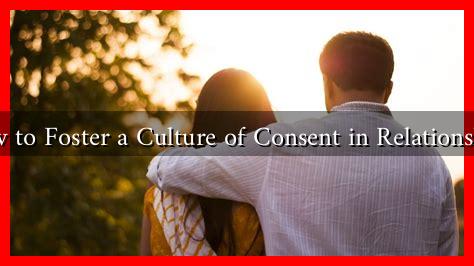-
Table of Contents
How to Foster a Culture of Consent in Relationships
In recent years, the conversation around consent has gained significant traction, particularly in the context of personal relationships. Understanding and practicing consent is crucial for fostering healthy, respectful, and fulfilling connections. This article explores how to cultivate a culture of consent in relationships, providing practical strategies and insights to help individuals navigate this essential aspect of interpersonal dynamics.
Understanding Consent
Consent is not merely a legal term; it is a fundamental aspect of any relationship, whether romantic, platonic, or professional. At its core, consent means giving permission for something to happen. It is an ongoing process that requires clear communication and mutual respect.
Key Principles of Consent
- Informed: All parties should have a clear understanding of what they are consenting to.
- Freely Given: Consent must be given without any form of coercion or manipulation.
- Reversible: Anyone can change their mind at any time, regardless of previous agreements.
- Enthusiastic: Consent should be enthusiastic and not given out of obligation or pressure.
- Specific: Consent for one activity does not imply consent for another.
Creating Open Lines of Communication
Effective communication is the cornerstone of a culture of consent. Partners should feel comfortable discussing their boundaries, desires, and concerns. Here are some strategies to enhance communication:
- Regular Check-Ins: Schedule time to discuss feelings and boundaries openly.
- Active Listening: Practice listening without interrupting, validating your partner’s feelings.
- Use “I” Statements: Express your feelings and needs without blaming or criticizing your partner.
For example, instead of saying, “You never listen to me,” try, “I feel unheard when we discuss our plans.” This approach fosters a more constructive dialogue.
Educating Yourself and Others
Education plays a vital role in fostering a culture of consent. Understanding the nuances of consent can help individuals navigate their relationships more effectively. Here are some resources to consider:
- RAINN (Rape, Abuse & Incest National Network) – Offers comprehensive information on consent and sexual violence prevention.
- Love Is Respect – Provides resources for young people on healthy relationships and consent.
- Planned Parenthood – Discusses consent in the context of sexual health and relationships.
Modeling Consent in Everyday Interactions
Fostering a culture of consent extends beyond intimate relationships; it should be modeled in all interactions. Here are some ways to practice consent in daily life:
- Ask Before Touching: Always ask for permission before initiating physical contact, even in casual situations.
- Respect Personal Space: Be mindful of others’ comfort levels regarding personal space.
- Encourage Autonomy: Support others in making their own choices, whether in social settings or decision-making processes.
Addressing Consent Violations
Even in the healthiest relationships, misunderstandings can occur. It is essential to address consent violations promptly and constructively. Here are steps to take:
- Stay Calm: Approach the situation with a level head to facilitate open dialogue.
- Communicate Clearly: Express how the violation made you feel and why it is important to address it.
- Seek Resolution: Work together to establish boundaries and prevent future violations.
Conclusion
Fostering a culture of consent in relationships is an ongoing journey that requires commitment, communication, and education. By understanding the principles of consent, creating open lines of communication, educating ourselves and others, modeling consent in everyday interactions, and addressing violations constructively, we can build healthier, more respectful relationships. Remember, consent is not just a one-time agreement; it is a continuous dialogue that strengthens the bonds between individuals. Embracing this culture not only enhances personal relationships but also contributes to a broader societal shift towards respect and understanding.

